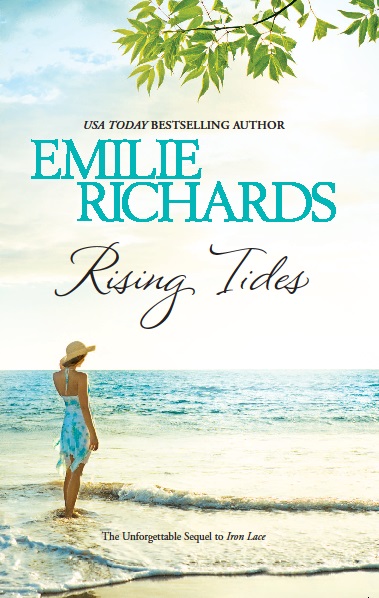Rising Tides
 Published by: Mira
Published by: MiraISBN13: 978-0778327646
Buy the Book: Amazon, Barnes & Noble
Reading Guide: View
Excerpt: View/Download
OVERVIEW
Nine people have gathered for the reading of Aurore Gerritsen’s will. Some are family, others are strangers. But all are about to have their futures changed, forever…
Aurore left clear instructions: her will is to be read over a four-day period at her summer cottage on a small island. Those who don’t stay will forfeit their inheritance. With a vast fortune at stake, no one will take that risk.
Suspicions rise as Aurore’s lawyer dispenses small bequests, each designed to expose the wealthy matriarch’s well-kept secrets. Family loyalties are jeopardized and shocking new alliances are formed as a lifetime’s scandals are revealed.
But with a savage hurricane approaching outside, tensions inside reach a dangerous climax. Can Aurore’s heirs survive the storm?
PRAISE
“Richards’s ability to portray compelling characters who grapple with challenging family issues is laudable.”
—Publishers Weekly
“…this novel features a multi-layered plot, vivid descriptions, and a keen sense of time and place.”
—Library Journal
AUTHOR'S NOTE
Louisiana is ruled by hurricanes, and so are my novels Iron Lace and Rising Tides. While Iron Lace begins with the tragic hurricane of 1893, Rising Tides ends with Hurricane Betsy, 1965.
Having grown up on the Gulf Coast of Florida, I come by my interest in hurricanes honestly, but my only Louisiana hurricane story is funny, unlike the ones in these two novels, or in real life and more recently Katrina. In 1985, just before the school year was to begin, my husband and I decided to take our four young children across Lake Pontchartrain to spend the night in a motel as a final celebration before school began. Since we were a bit off season, we had the place to ourselves, but in the middle of the night we began to hear noises. Because we were half asleep we assumed we’d just been assigned noisy neighbors.
Much to our surprise, the next morning we discovered the parking lot was completely packed with cars, all the chairs around the pool were gone and the pool itself was closed. While we slept, Hurricane Elena had turned to threaten New Orleans, and many of the city’s citizens had evacuated.
We, of course, had done nothing to protect our home. So while everyone else was leaving the city and settling into our motel, we packed up and crossed the bridge back to New Orleans. The worst of the storm bypassed us–as it did during every scare in our years there–but now, post-Katrina, I wonder what we were thinking that day. After all the research I had done on Louisiana hurricanes, I hurried back into one’s path. For our trouble, though, our children did enjoy a ride through our swamped front yard in a neighbor’s pirogue. Every foolish act has its compensations. Mais oui?
Footnote: We had moved to Virginia by the time Katrina ravaged the city, long after Iron Lace and Rising Tides were written. The house we had owned in Gentilly near Lake Ponchartrain survived the storm, but only just. Water topped the windows and now the house has been gutted and waits for final demolition. Our bustling street is now inhabited by ghosts.
I strongly believe the insensitive and inadequate response to the misery caused by this storm is a national shame. New Orleans is no longer the City That Care Forgot, but the City our Nation Forgot. Largely due to the courage and hard work of volunteers from all over the country plus local citizens who have braved untold hardships to continue to call New Orleans their own, the city survives. For this, at least, we can be thankful.